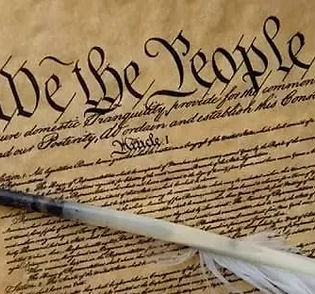

THE LEGAL CHRONICLE
Where Is India's Orginal Constitution?
JULY 21, 2020
ARTICLE14- EQUAL PROTECTION OF LAWS
Article 14 of the Constitution declares that ‘the state shall not deny to any person equality before the law or the equal protection of the laws within the territory of India’.
The concept of equality does not mean absolute equality among human beings which is physically not possible to achieve .It is a concept implying absence of any special privilege by reason of birth,creed or the like in favour of any individual, and also the equal subject of all individuals and classes to the ordinary law of land. Dr Jennings say that” Equality before the law means that among equals the law should be equal and should be equally administered that like should be treated alike.”
The guarantee of equal protection of laws is similar to one embodied in the 14th Amendment to the American Constitution.This has been interpreted to mean subjection to equal law, applying to all in the same circumstances.It only means that all persons similarly circumstanced shall be treated alike both in the privileges conferred and liabilities imposed by the laws.Equal law should be applied to all in the same situation and there should be no discrimination between one person and another. As regards the subject matter of the legislation their position is the same. Thus the rule is that the like should be treated alike and not that unlike should be treated alike.

Aashita Jain
IIMT AND SCHOOL OF LAW, GGSIPU
JULY 21, 2020
CYBER ATTACKS IN COVID -19
A cyber attack is a malicious and deliberate attempt by an individual or group of individuals to violate the information system of another individual or group of individuals. Usually, the attacker seeks some type of benefit from disordering the victim’s network.
because of lockdown and corona we are compelled to work from home in this situation which increased the usage of internet ,increase of internet usage is also providing opportunities to cybercriminals and leading problems like malware attack, phishing, SQL injection and DNS tunneling, cyber criminals are targeting internet users with such attacks and taking advantages of the corona outbreak . India has second largest internet users population, India has around 560 million of active internet users ,which provides immense opportunities for cyber criminals in comparison to other countries, in India cyber crimes has been occurring with increasing frequency that’s why India’s cyber security policy needs new up gradation and updates to counter cyber crimes in country.

Anshul Rajak
jagran lakecity university
JULY 21, 2020
RATHAYATRA V AMARNATH YATRA: THE DECISION OF THE SUPREME COURT
The Supreme Court in its historic decision had stayed the Lord Jagannath Rathayatra at Puri. Days later, it modified the decision and granted permission to conduct the festival and left the matter of management of the festival to the state government, the Centre and the temple management authorities on the ground that it would be difficult for the Highest Court to “micro-manage” the festival. A few days later when a similar case came up to the Supreme Court urging to restrict the Amarnath yatra, the Supreme Court refused to entertain the plea. It further went on to say that the matter should be left to be decided upon the local administration to decide whether to conduct the holy yatra during the pandemic. The organization called “Amarnath Barfani Langar” filed a plea in the highest Court seeking to restrict the holy yatra to stop the furher spread of the virus and came up with the idea of virtual visit by making arrangements for a “live darshan” of the Amarnath Shrine. In both the cases, the Supreme had granted the local authority to look into the matter on the ground that it cannot enter into the arena of the executive and the district administration. While it took up the Case of the Jagannath Rathayatra, it refused to take up the matter of the Amarnath shrine. Though the petition was turned down, it was granted the liberty to reprent in front of concerned authorities. While the Court turned down the plea concerning the Amarnath yatra, the plea of the Chariot Festival as well should have been left to be decided by the local authorities at the first place without taking up the matter, to get away with the allegations of dichotomy or hypocrisy against the highest judicial body.

Gargi Santra.
LLM, Dharmashastra National Law University.














